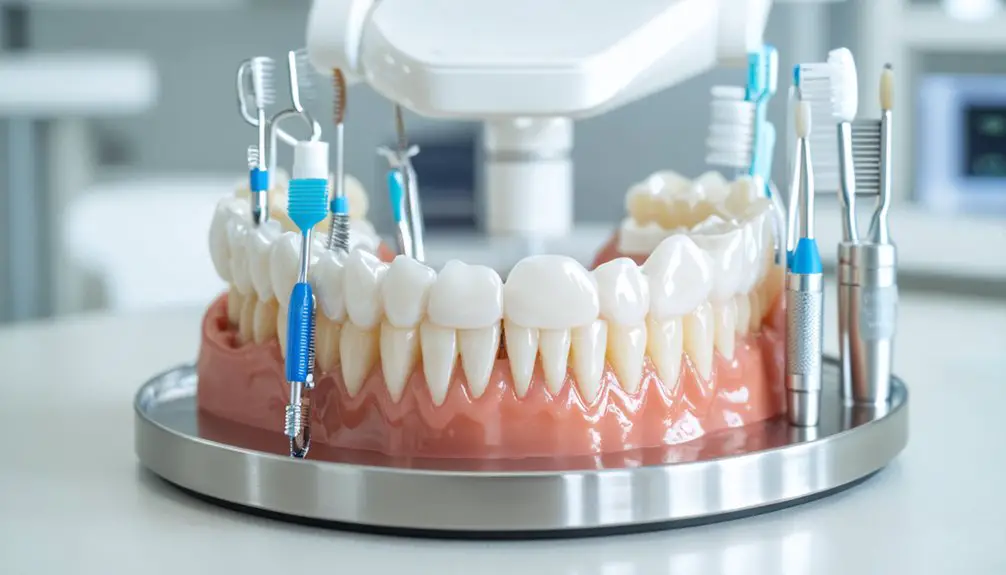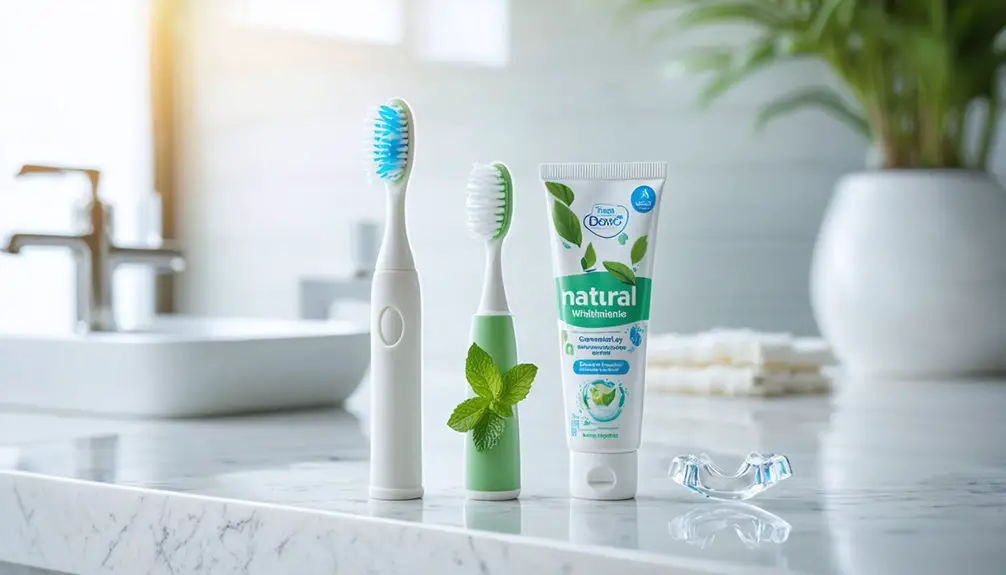If you have dry mouth, teeth whitening treatments pose three major risks to your oral health. You’ll likely experience heightened tooth sensitivity and pain due to increased enamel permeability. Your results may be uneven and patchy because reduced saliva affects gel distribution and stain removal. Most concerning, you’ll face an elevated risk of enamel damage and decay since dry mouth conditions amplify the demineralizing effects of whitening agents. Understanding these risks can help protect your dental well-being.
Key Takeaways
- Heightened tooth sensitivity and pain occur due to increased enamel permeability when whitening treatments are combined with dry mouth conditions.
- Lack of saliva leads to uneven whitening results and patchy discoloration across tooth surfaces.
- Dry mouth amplifies the risk of enamel damage and decay when exposed to whitening agents that reduce tooth microhardness.
- Post-treatment discomfort lasts longer in dry mouth patients due to reduced protective mechanisms from insufficient saliva.
- Whitening treatments increase tooth dehydration, which can worsen existing dry mouth symptoms and oral health issues.
Heightened Tooth Sensitivity and Pain
While teeth whitening is a popular cosmetic procedure, it frequently causes tooth sensitivity that affects between 30-78% of patients, with risks heightened considerably for those with dry mouth conditions.
When you undergo whitening treatment, peroxide agents temporarily increase enamel permeability and demineralize tooth structure, exposing the underlying dentin where nerves reside. Individuals with sensitive teeth should exercise extra caution before proceeding with any whitening treatments.
Without adequate saliva flow for protection and remineralization, you’ll experience more intense and prolonged sensitivity. Studies show higher peroxide concentrations above 35% significantly increase sensitivity risk and discomfort levels. The whitening agents can stimulate nerve endings through microscopic tubules in your dentin, leading to heightened pain that requires careful sensitivity management.
For effective pain relief, you’ll need to address both the whitening-induced sensitivity and dry mouth symptoms simultaneously.
The discomfort typically peaks immediately after treatment but can persist longer in dry mouth patients due to reduced natural protective mechanisms.
Uneven Results and Tooth Discoloration
Beyond sensitivity concerns, dry mouth conditions considerably affect the evenness and stability of teeth whitening results. When your mouth lacks adequate saliva, whitening gel doesn’t distribute uniformly across tooth surfaces, leading to patchy whitening and inconsistent stain removal.
You’ll notice areas of uneven coloration where reduced saliva flow impacts gel penetration. The problem extends beyond initial treatment, as moisture retention becomes critical for maintaining results. The increased porosity of enamel during whitening makes uneven results even more pronounced in dry mouth conditions.
Custom-fitted trays help minimize uneven gel distribution, but dry mouth still poses challenges. Dehydrated enamel appears duller and becomes more susceptible to absorbing new stains unevenly. Without proper saliva flow, your teeth may develop a temporary bluish or milky tint, and environmental chromogens can quickly create new discolorations.
Your enamel’s natural protective barrier weakens, making it harder to achieve and maintain uniform whitening results without addressing the underlying dry mouth condition.
Increased Risk of Enamel Damage and Decay
Because teeth whitening agents reduce enamel microhardness and increase surface roughness, dry mouth conditions greatly amplify your risk of structural damage.
Without adequate saliva flow, your teeth lack the natural protection against enamel erosion and can’t effectively remineralize after exposure to whitening agents. The peroxide-based whiteners cause demineralization effects that are particularly concerning when you have dry mouth, as there’s insufficient buffering of acids and mineral replacement. Many over-the-counter whitening products lack proper regulation and safety testing.
Your daily oral hygiene routine can further compound the damage. Getting a dental consultation first is essential to evaluate whether your dry mouth condition makes you a suitable candidate for whitening treatment.
When you brush teeth that have been softened by whitening treatments, you’re more likely to experience accelerated wear, especially without proper salivary lubrication. This combination of factors creates a heightened risk for tooth decay, sensitivity, and progressive enamel loss over time.
Frequently Asked Questions
Can I Use Natural Teeth Whitening Remedies if I Have Dry Mouth?
You can use gentle natural remedies for whitening, but you’ll need to carefully choose ones that won’t worsen your dry mouth. Focus on oral health-friendly options like coconut oil pulling and xylitol gum.
How Long Should I Wait Between Whitening Treatments With Dry Mouth?
Want to protect your sensitive teeth? With dry mouth, you’ll need to wait 2-4 weeks between whitening treatments. Standard whitening frequency guidelines extend longer for dry mouth management to prevent enamel damage.
Will Medications Causing Dry Mouth Affect My Teeth Whitening Results?
Yes, your dry mouth from medications can reduce whitening effectiveness and increase sensitivity. You’ll need closer monitoring, proper hydration, and possibly modified treatment protocols to achieve ideal results.
Are Professional Whitening Treatments Safer Than At-Home Kits for Dry Mouth?
Yes, you’ll find professional treatments offer better safety for dry mouth. Your dentist can control peroxide levels, monitor side effects, and customize treatment specifically for your condition, unlike at-home kits’ unpredictable results.
Should I Stop Whitening if My Dry Mouth Symptoms Worsen?
Yes, you should stop whitening immediately if your dry mouth symptoms worsen. Continuing treatment could damage your oral tissues and enamel. Contact your dentist to discuss safer whitening options for your situation.
References
- https://www.alondradental.com/does-teeth-whitening-have-side-effects/
- https://www.natrusmile.com/blogs/news/how-to-rehydrate-teeth-after-whitening
- https://keltydental.co.uk/are-there-any-side-effects-of-teeth-whitening/
- https://www.goochdental.com/blog/2020/08/14/understanding-the-side-effects-of-206309/
- https://www.webmd.com/oral-health/teeth-whitening
- https://www.loudfamilydentistry.com/blog/teeth-whitening-related-statistics-on-effectiveness-and-sensitivity-incidence
- https://www.oxyfresh.com/blogs/dental-health/does-teeth-whitening-cause-tooth-sensitivity
- https://meridian.allenpress.com/operative-dentistry/article/37/5/464/206268/Clinical-Comparative-Study-of-the-Effectiveness-of
- https://www.marsfielddentalcare.com.au/why-do-teeth-feel-rough-after-whitening/
- https://youngdentalsf.com/how-to-rehydrate-teeth-after-whitening-for-comfort-and-lasting-results/



